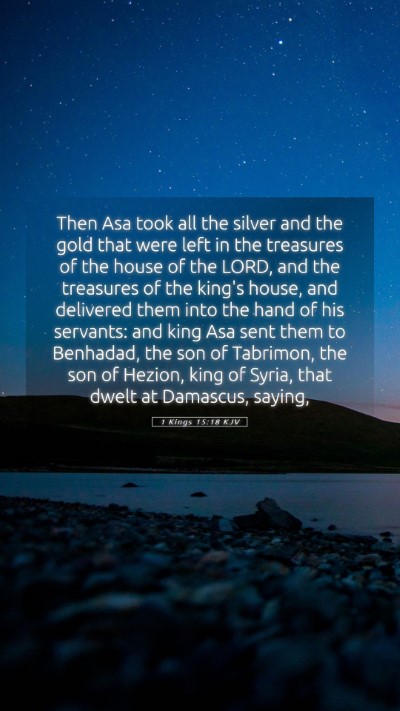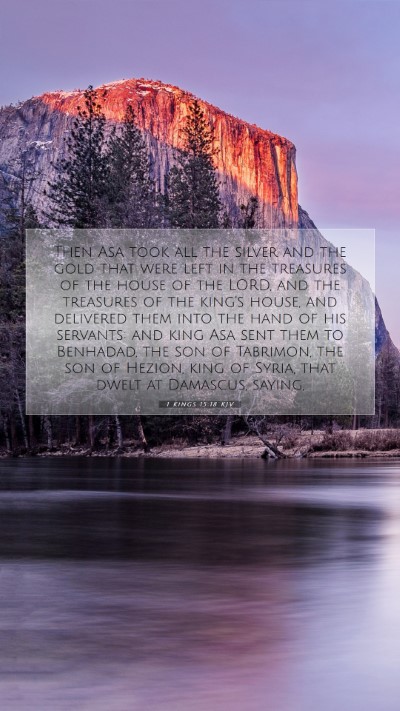Understanding 1 Kings 15:18: A Deep Dive into the Meaning
1 Kings 15:18 states:
"And Abijah took all the stones of the sanctuary which his father Asa had dedicated, and he restored them to the altar of the Lord."
This verse sheds light on the actions of King Abijah and his efforts to restore worship in Israel.
Through the lens of various commentaries, we can explore the deeper meanings and interpretations to enhance our Bible verse understanding.
Overview of Commentary Insights
The commentaries by Matthew Henry, Albert Barnes, and Adam Clarke provide rich insights into the significance of 1 Kings 15:18.
Below is a summary of their perspectives:
-
Matthew Henry:
Henry emphasizes the restoration aspect of Abijah's actions, indicating that by reclaiming the stones and dedicating them to God, Abijah was reinstituting rightful worship practices.
This reflects the importance of returning to foundational aspects of faith and community.
-
Albert Barnes:
Barnes highlights the historical context of Abijah’s reign, noting the challenges he faced.
His choice to restore the altar signifies a turning away from the idolatry that had permeated Israel, seeking to reaffirm God’s sovereignty over his kingdom.
-
Adam Clarke:
Clarke elaborates on the significance of the stones as symbols of the covenant between God and His people.
The act of restoring them illustrates a commitment to uphold the sacred relationship and ensure that the worship practices align with divine mandates.
Key Themes and Messages
The exploration of 1 Kings 15:18 provides several themes relevant to Bible verse interpretations and application:
-
Restoration: Abijah's act is a representation of spiritual revival. It serves as a reminder that returning to the fundamentals of faith is crucial for personal and communal reconciliation with God.
-
Obedience: By restoring the stones to the altar, Abijah demonstrates obedience to God's will, which is a recurring theme throughout Scripture.
-
Covenant Loyalty: The act of dedicating the stones again signifies fidelity to God’s covenant, emphasizing the necessity for the people of Israel to remain loyal in their worship and practices.
Cross References and Related Verses
To gain further understanding of 1 Kings 15:18, consider studying the following related verses:
- 2 Chronicles 14:3-5 - Discusses Asa's reforms and dedication to abolishing idolatry.
- 1 Kings 14:7-8 - Reflects on the faithfulness of David, contrasting it with the unfaithfulness in the subsequent generations.
- 2 Kings 12:4-5 - Talks about Joash and the restoration of the temple, similar in theme.
Application of 1 Kings 15:18
This verse can be applied in various ways in our daily lives:
-
Importance of Worship: Reflect on the quality and intention behind your worship practices and make adjustments that align more closely with Biblical teachings.
-
Restoration in Relationships: Just as Abijah restored the altar, consider areas in your life that require restoration, be it in personal relationships or community dynamics.
-
Covenant with God: Evaluate your own commitment to God and seek ways to deepen your spiritual journey.
Conclusion
1 Kings 15:18 prompts us to consider themes of restoration, obedience, and covenant loyalty, as illustrated through the insightful Bible verse commentaries shared above.
Engaging deeply with the meaning of Bible verses such as this can enrich our understanding of both the historical and spiritual dimensions of Scripture.
As we continue our Bible study insights, let this verse inspire us to dedicate our lives earnestly to the service of God, ensuring that our worship is genuine and anchored in His Word.


